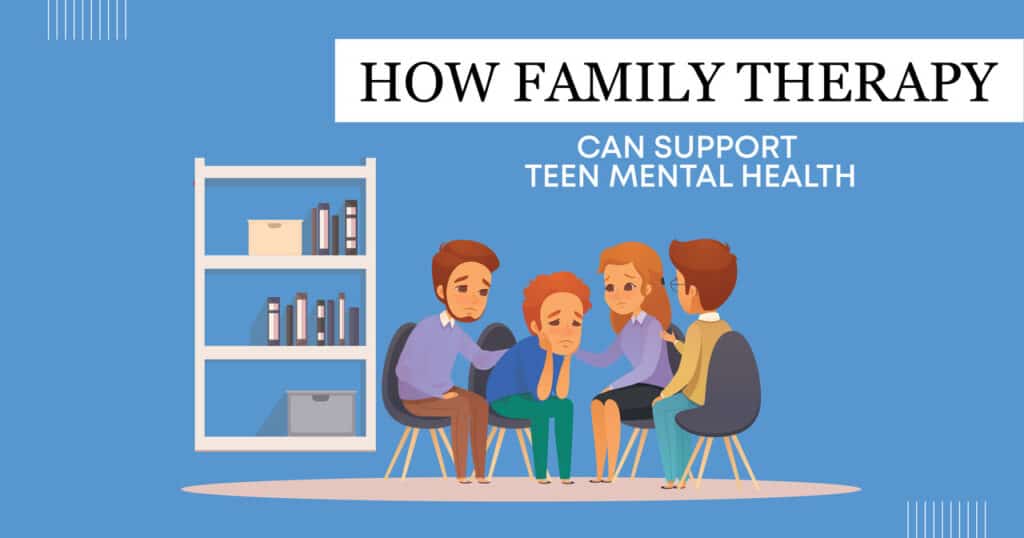Understanding the Role of Family Therapy
There comes a crucial time in any teenager’s developing life when the stage of mental health will prove decisive for their future. Adolescence is when teenagers experiment with their identity, develop relationships, and learn to survive in an intricate world filled with academic pressures, social expectations, and emotional changes. Painfully many teens fail to conquer their problems in this period, and such pains often become overpowering.
Family therapy for teens can also prove valuable as a resource. While traditional therapy focuses mainly on the individual, family therapy creates scope by including the whole family unit in its healing process. It offers a holistic means of supporting teens dealing with mental health conditions by giving them room to grow in collaboration with supportive teammates.
Family therapy for teens will not only address family dynamics that could contribute to or solve a teen’s mental health issues but also strengthen relationships through improved communication. This guide will examine the importance of teen mental health support and how family therapy works while navigating the benefits of family therapy for adolescents.
Why Teen Mental Health Requires Family Involvement
Teenagers face many challenges that lead to mental health issues, including peer pressure, bullying, family conflicts, academic stress, and various influences from social media. Individual therapy can be helpful, but it acknowledges that teen mental health support isn’t about how to treat the teen in isolation, but rather how to change the environment in which they live.
The Influence of Family on Teen Mental Health
Family can be viewed as the most influential support system in a teenager’s life, and family members have an extraordinary influence on the emotional well-being of a teen. Family dynamics may play a gigantic role when a teen struggles with issues such as anxiety, depression, or behavioral problems. It may be through poor communication between members, unforgotten conflict, or lack of emotional support that these types of family issues may either contribute to or exacerbate a teen’s mental health struggles.
The Importance of Family Therapy
Family therapy is vital because it ensures that these issues are addressed. This will help the family understand why a teen is not behaving or performing up to par and provide them with ways to create a healthier, more supportive home environment. In many situations, it is not just the teen who needs therapy, but the whole family can as they learn how better to communicate with, set boundaries for, and offer support for a teenager.
How Family Therapy Works: Key Principles
Family therapy for teens is a form of psychotherapy aimed at changing relationships and communication dynamics within the family unit. This is different from traditional individual therapy because it does not focus on the teen alone but rather on involving all family members. The core objective is to strengthen links within the family, enhance communication skills, and resolve conflict or disagreement.
At the core of family therapy, there is the premise that the causation, as well as solutions to mental illness challenges, need to be taken by the family as a unit. Family therapy involves all the household members. The therapist works together with the various members of the household to make them understand one another and improve communication among them. They facilitate exercises and discussions with the family as a team to increase empathy and emotional support.
Some of the basic family therapy principles for teens are:
- Open Communication. Therapists allow family members to express their thoughts and ideas to one another in a healthy, respectful manner.
- Conflict Resolution. It allows families to cope constructively with conflicts. This results in less tension and more effective relationships.
- Systemic Perspective. A therapist considers the entire family system rather than just the teen and tries to understand if some pattern could be responsible for causing such a problem.
- Collaborative Problem-Solving. By involving the therapist, families come together to develop strategies and solutions that help everyone, but more importantly, the teen.
Benefits of Family Therapy for Teen Mental Health
The benefit of family therapy to the teen lies in being able to affect issues holistically. Bringing the entire family together allows therapy to create long-lasting, positively impacting changes within the teen’s emotional well-being and the overall health of the family unit. Some of the significant benefits of family therapy are as follows:
- Strengthening Family Bonds
The ordeal often stretches family relationships when dealing with a struggling teenager about mental health. Repairing these family relationships can be made possible through family therapy; therefore, the ones that make it possible are open communication and mutual understanding.
Through shared experiences and therapeutic activities, families can reconnect and develop a support system much more potent than previously.
- Enhanced Communication
Teens often feel they are not heard or even cannot talk more openly to their parents or siblings, which intensifies mental disorders. In teen family therapies, therapists arm the people participating with tools that can improve communication between these family members, which allows the teen to talk freely and the parents to understand their own teen’s problems.
- Improved Emotional Support
Family therapy for teens is essentially building an emotional support system for the teen. That is to say, a teen is shown what kind of emotional support his members of family can provide for him. This is likely to prove a strong motivator for a teen’s recovery from a mental illness.
- Conflict Resolution
Teenagers often find themselves in conflicts with their parents or siblings, which may lead to isolation, frustration, and anger. Family therapy for teens addresses all these conflicts by helping teenagers and their family members approach disagreements healthily and productively.
- Positive Mental Health Outcomes
Doing family therapy for adolescents has the aim of developing the teenager’s mental health development. By improving on family dynamics that affect the teenager, teen therapy will prevent huge and persistent symptoms of depression, anxiety, or other mental health issues that they encounter. This means stronger coping mechanisms and a more stabilized life.
Common Issues Addressed in Family Therapy for Teens
There are so many mental health issues that family counseling for teenagers can address. Issues will be summarized as follows:
- Anxiety and Depression
Among the most common mental conditions in teenagers these days, anxiety and depression are present. Whether it is due to academics, social life, or conflicts with the family, these will become hard-hitting.
Family therapy helps because they can identify the cause of these problems and start correcting them with the family environment; they train the teens with coping mechanisms so that their family can deal with them effectively.
- Behavioral Issues
Teenagers are seen to act out, abuse substances, and engage in other malicious behavior; such behavior is usually associated with emotional problems, and family therapy for teenagers provides a healing environment where they might talk over these issues and grow better ways of coping.
- Family Conflict
Divorce, remarriage, and sibling rivalry are common causes of family friction. Family therapy can help each member of the family to understand another’s point of view and also to meet at a midway.
- Trauma
Many adolescents face traumatic experiences that can be as vicious as abuse, neglect, bullying, or even losing a close family member. Teen family therapy will provide a comfortable environment with which to address such trauma that the adolescent should be required to overcome.
- Communication Problems
As brothers and sisters fail to connect well, family members tend to understand one another and express themselves much less effectively. A teenage family counselor helps everybody learn how to communicate more effectively and how to listen and respond more sensitively to the views of others.
How Family Therapy Enhances Communication and Understanding
One of the most fundamental benefits of family therapy for teens is that it can help mend communication patterns between their households. Such parent-teen communication patterns most often tend to be irritable and pose an emotional distance between them. Through mediating this relationship, family therapy creates an open platform for everyone to speak out and understand one another.
A family therapist will lead the family through practice sessions encouraging listening, empathy, and understanding. For example, a therapist might ask a family member to repeat what another member has said so they can understand the intent behind what was being communicated before responding. This easily avoids misunderstandings and promotes a deeper connection between family members.
Role-playing exercises, in which a therapist helps family members see things from the perspective of their teenager, are also common. These exercises allow people to better understand their roles in relation to how others might understand their actions/words.
What to Expect in a Family Therapy Session
A family therapy session for adolescents will include the adolescent, parents, and sometimes their siblings. Sessions are typically conducted by a trained therapist who specializes in adolescent issues.
The first step would be to gather information from the family as well as the teen concerning the dynamics of the family and the problems one is experiencing with the teen’s mental health. Then, the therapist would have the family participate in setting some kind of goals or objectives for the therapy, perhaps improved communication, conflict resolution within the family, or maybe some specific mental health problems such as anxiety or depression.
The sessions should be open to discussion at all times. There will be a free-flowing conversation guided by coping strategies. Every member needs to be open to the whole process and participate in exercises meant to aid in building a healthier family dynamic.
Choosing the Right Family Therapist for Your Teen
Choosing a qualified therapist is a significant step toward a successful outcome of family therapy for teens. An ideal therapist would be experienced in working with adolescents and families and trained in adolescent mental health therapy.
In the first session, ask them what approach they follow, how experienced they are with problems related to your family, and how they manage a session. An effective family therapist must be compassionate and nonjudgmental, with the skills to facilitate when a conversation can’t go on without controversy. You should feel comfortable and supported at every stage.
The Lifelong Benefits of Family Therapy for Teen Mental Health
Teenagers face a variety of mental health challenges that can impact their emotional and psychological well-being. Family therapy for teens offers a unique opportunity to address these issues within the context of the family unit, providing a holistic and collaborative approach to healing.
The benefits of family therapy extend beyond just the teen, strengthening family bonds, improving communication, and creating a supportive environment for growth whether dealing with anxiety, depression, behavioral issues, or trauma, family counseling for teenagers can be a transformative tool in the journey toward better mental health.
Call To Action
By embracing family therapy for teens, families can ensure they receive the necessary support, creating lasting positive changes for the adolescent and the entire family. If your teen is struggling with mental health issues, consider family therapy for teens as a powerful tool to support their recovery and overall well-being.
FAQs
- What is family therapy for teens?
Family therapy for teens involves the teen and their family working with a trained therapist to address mental health issues, improve family dynamics, and enhance communication. It helps resolve conflicts and provides emotional support to the teen.
- How can family therapy support teen mental health?
It creates a supportive environment for open communication, helping family members understand the teen’s challenges. This strengthens relationships and provides a foundation for better emotional and psychological support.
- What are the benefits of family therapy for teens?
Benefits of family therapy include improved family relationships, better communication, emotional support for the teen, conflict resolution, and addressing mental health issues like anxiety and depression in a family context.
- How do I know if family therapy is right for my teen?
If your teen is suffering from anxiety, depression, or behavioral issues and if communication and conflict have become issues in the family, then indeed, teens can find a great option in family therapy.
- What happens during a family therapy session for teens?
In sessions, family members discuss issues openly, guided by the therapist. The goal is to improve understanding, resolve conflicts, and learn healthier ways to communicate and support the teen.




